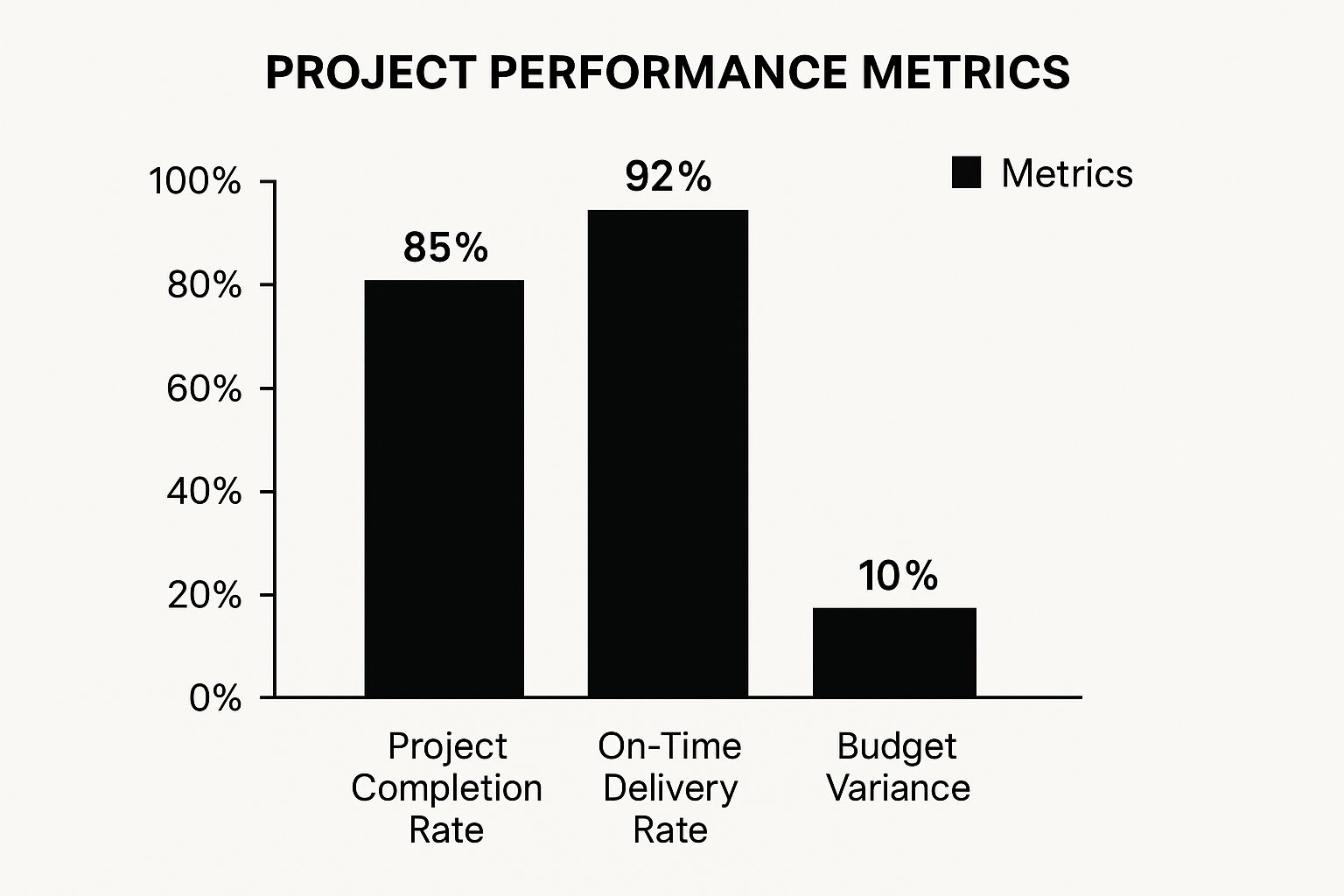Your Guide to a Junior Project Manager Career
- Janis Kolomenskis
- Jul 21
- 14 min read
So, you're curious about the Junior Project Manager role? Let's dive in. Think of the Junior PM as the essential "glue" that holds a project team together. They're the ones on the ground, supporting senior managers and making sure all the day-to-day pieces of a project fit together perfectly. They handle the crucial administrative and coordination tasks that keep things on schedule, within budget, and heading toward the same goal.
What Does a Junior Project Manager Actually Do?

Welcome to the incredibly exciting world of project management! If you're wondering what a Junior PM really does behind the title, you've come to the right place. This role is a fantastic launchpad for a thrilling career, giving you a mix of real responsibility, constant learning, and hands-on experience that builds an unshakable foundation for future leadership.
Here’s an analogy I love: imagine a bustling film set. The director has the grand vision, of course. But it's the first assistant director who's actually on the ground, making sure every actor, prop, and camera is in the exact right place at the exact right time. A Junior Project Manager plays a very similar part. You aren't calling all the shots just yet, but you are absolutely indispensable for keeping the whole production moving forward without a hitch.
The Evolving Landscape of Project Management
The role of a Junior PM isn't what it was a decade ago, especially in fast-paced fields like tech. The rise of Agile methodologies has completely reshaped what's expected. It's no longer about just following a rigid, unchanging plan. Now, it's all about adapting to change, fostering incredible collaboration, and delivering value to the customer—fast. In fact, over 70% of organizations now report using Agile practices in some form.
This massive shift is directly reflected in what companies are looking for when they hire. For instance, it's common to see modern job listings that require at least two years of experience in an Agile software environment. This really underscores the growing demand for Junior PMs who can jump right in and:
Organize and facilitate key meetings for product owners and scrum masters.
Diligently document and track every project risk and dependency.
Ensure all deliverables hit their targets for time, quality, and budget.
The modern Junior Project Manager is so much more than a task-tracker; they are a central communication hub. They need fantastic people skills and a solid command of tools like Jira, SharePoint, and Microsoft Office to keep everyone connected and collaborating effectively.
To give you a quick, at-a-glance view of these responsibilities, here's a breakdown of what a typical day might involve.
Junior PM at a Glance: Key Responsibilities
Core Function | Typical Tasks | Why It Matters |
|---|---|---|
Project Coordination | Scheduling meetings, preparing agendas, distributing minutes. | Keeps the team aligned and ensures everyone has the information they need to move forward. |
Status & Progress Tracking | Updating project plans, monitoring task completion, tracking milestones against deadlines. | Provides a clear, real-time view of the project's health, allowing for quick adjustments. |
Communication Hub | Acting as the go-to person for updates, clarifying requirements between teams. | Prevents misunderstandings, reduces friction, and keeps information flowing smoothly. |
Risk & Issue Management | Maintaining a risk log, flagging potential problems to the Senior PM, tracking issue resolution. | Helps the team stay ahead of problems, turning potential crises into managed tasks. |
Documentation & Admin | Organizing project files, managing resources, preparing reports. | Creates a single source of truth for the project, ensuring consistency and accountability. |
This table really highlights how the Junior PM is the connective tissue for the entire team. You're facilitating clear communication, keeping an eye on progress, and flagging potential roadblocks before they become major disasters. It's a dynamic, hands-on position that's absolutely vital to any organization's success. You can see these exact requirements reflected in current job descriptions across the tech sector.
Mastering Your Core Responsibilities

Alright, so what does a junior project manager actually do all day? Forget the vague job descriptions for a second. Let's get into the real, nitty-gritty tasks that will fill your days and build your career. Think of your role as turning the project's big-picture strategy into a series of clear, daily actions.
You are the engine room of the project. While the senior project manager is on the bridge steering the ship, you’re the one making sure everything below deck is running smoothly, all the logs are up to date, and everyone knows what’s happening. It’s all about mastering the details that truly drive a project forward.
Turning Fuzzy Ideas Into Real Work
Job descriptions often list responsibilities that sound, well, a little abstract. To really get a feel for the role, you have to translate those concepts into the actual things you’ll be doing every single day. This is where you cut your teeth and build that rock-solid foundation as a junior PM.
Here’s how those common duties look in the real world:
"Tracking progress" really means you're the one hopping into Jira to update task statuses and then putting together a sharp, easy-to-read weekly report for the senior PM.
"Managing documentation" means you become the owner of the project’s SharePoint or Google Drive. You’ll make sure meeting notes are captured, filed logically, and sent out to the team within 24 hours.
"Coordinating communication" is you, a master of scheduling, setting up that crucial bi-weekly meeting between the dev and marketing teams and making sure everyone has the agenda well in advance.
These aren't just minor chores; they're the lifeblood of a healthy project. Your dedication to these details is what prevents small issues from spiraling into chaos. It frees up the rest of your team to do what they do best. A brilliant junior PM is truly the secret weapon of any high-achieving team.
A project without clear documentation and scheduling is like trying to build a house without a blueprint. The junior project manager is the one holding that blueprint, making sure everyone is working from the same plans and knows exactly what’s next.
Your Daily Mission Briefing
Your day-to-day is a mix of looking ahead and reacting to what's happening right now. You’re often the first person the team comes to with a question, which makes you the central hub for information and help.
Here are some of the key duties that will pop up on your calendar constantly:
Scheduling and Facilitation: You’ll live in calendars, setting up important stakeholder meetings, booking the right conference rooms (virtual or physical!), and prepping agendas so every meeting is productive from the get-go.
Maintaining Project Plans: This is your daily dive into tools like Trello, Asana, or Jira. You'll be updating timelines, tweaking task dependencies, and making sure the project plan is a perfect reflection of what's actually happening.
Budget Monitoring: You’ll be the senior PM's right hand, keeping a close eye on expenses, flagging any costs that are creeping up too high, and pulling together simple budget reports for review.
Stakeholder Updates: You'll likely be the one drafting the first version of those all-important stakeholder updates, giving them a clear, consistent pulse on the project's progress and milestones.
At the end of the day, every single task you tackle adds to the project’s momentum and clarity. By owning these core responsibilities, you're not just playing a supporting role—you're actively building the hands-on experience you'll need to lead incredible projects of your own.
The Essential Skills That Make You Shine

Crushing it as a junior project manager isn't just about what you do—it's about how you do it. The real secret sauce is a powerful blend of hard and soft skills. This combination is what builds unstoppable career momentum and separates the truly great junior PMs from the merely good ones.
Think of it this way: hard skills are your technical toolkit, the specific, teachable abilities you need to manage a project. But your soft skills? That's your personal magic—it’s how you lead, communicate, and solve problems under pressure. To truly succeed, you need to be a master of both.
Your Must-Have Hard Skills
Let’s talk tools. Hard skills are the practical, hands-on abilities that keep the project engine running smoothly. For any aspiring junior PM, the absolute first thing to get comfortable with is project management software. This isn't just about clicking buttons; it's about using these platforms to bring clarity to your team and solve real problems.
Task Management Tools (Trello, Asana, Jira): You need to be genuinely fluent in at least one of these. That means confidently spinning up a project board, assigning tasks with crystal-clear deadlines, and using labels (like "High Priority" or "Blocked") to keep everyone aligned. You should be the go-to person for moving tasks from "To-Do" to "Done."
Spreadsheets (Google Sheets, Excel): No need to be a spreadsheet guru, but you absolutely must be comfortable whipping up a basic schedule, tracking a simple budget, and using functions like . This is your bread and butter for creating quick, data-driven reports that keep stakeholders informed.
Having a solid grip on these tools proves you can handle the core mechanics of any project. It’s a clear signal that you're organized, detail-oriented, and ready to jump into the action.
The Soft Skills That Set You Apart
If hard skills are your toolkit, soft skills are the finesse you use to build incredible things with it. These abilities are tougher to measure but are, frankly, far more crucial for your long-term career growth. Companies aren't just hiring a task-ticker; they're investing in a future leader.
The Perfect Follow-Up Email: A Quick Template Subject: Quick Follow-Up: [Project Name] - Next Steps on [Specific Task] Hi [Stakeholder Name], Hope you’re having a great week! Just wanted to quickly follow up on our conversation about [specific task]. To keep things moving, the next step is for [Person's Name] to [action needed]. To help, I’ve attached the [relevant document] we discussed. Please let me know if you need anything else from my end! Best, [Your Name]
This kind of proactive, clear communication is an absolute game-changer. It shows initiative, organization, and a genuine drive to push the project forward. Other essential soft skills include proactive problem-solving—figuring out what to do when things inevitably go off track—and masterful time management. Juggling competing demands from different people without dropping the ball is the true mark of a top-tier junior PM.
As you polish your resume, it's wise to learn how to present these skills effectively. For tips on making sure your application gets past the initial screening, check out this fantastic guide to understanding an ATS tracking system.
Your Career Path And Salary Expectations
Becoming a junior project manager isn't just about landing a job; it's about igniting a dynamic career. Think of it as the ultimate launchpad. This role is your ticket to climbing the ladder, from supporting projects today to leading massive, complex initiatives or even directing an entire Project Management Office (PMO) down the road.
The beauty of it is that the skills you hone here—planning, executing, communicating—are universally valuable. They'll open doors in any industry you can imagine, whether you're drawn to the fast pace of tech, the life-changing work in healthcare, the tangible results of construction, or the vibrant world of creative agencies.
Charting Your Growth
So, what does that journey actually look like? The career path from a junior PM is refreshingly logical and full of exciting milestones. Once you’ve mastered the art of supporting projects, you’ll be ready to start leading them.
Here's a common trajectory:
Project Manager: After a couple of years of solid performance, you'll be handed the reins. You'll graduate from supporting senior managers to owning smaller projects from start to finish.
Senior Project Manager: With a portfolio of wins under your belt, you'll be trusted with bigger, more complex, and higher-stakes projects. This is often where you start mentoring the next wave of junior PMs.
Program Manager: At this level, your perspective widens. You'll oversee a whole collection of related projects, making sure they all work together to hit the company's biggest strategic goals.
Director of PMO: Reach the top, and you could be the one leading the entire project management function for an organization, setting the standards and strategy for every project that gets the green light.
This chart shows some of the core metrics you'll be responsible for driving as a junior PM. Nailing these is what proves your value and fuels your growth.

These numbers—Project Completion Rate, On-Time Delivery, and Budget Adherence—aren't just stats on a dashboard. They are the language of project success and the heart of a junior PM's day-to-day impact.
Understanding Your Earning Potential
Alright, let's talk money. What can you actually expect to earn in this role? A junior PM's salary isn't a one-size-fits-all number. It’s shaped by where you live, your industry, the size of the company, and any certifications you’ve earned. For example, a junior PM in a tech hub like New York City will almost certainly earn more than one in a lower-cost area.
Salary expectations for a Junior Project Manager can vary quite a bit based on experience and location. The table below gives you a snapshot of what that can look like across different scenarios.
Junior Project Manager Salary Ranges by Experience and Location
Experience Level | US National Average | New York City (High-Cost) | Midwest City (Average-Cost) |
|---|---|---|---|
0-1 Years | $51,341 | $62,000 - $70,000 | $48,000 - $55,000 |
1-3 Years | $62,000 | $70,000 - $80,000 | $55,000 - $65,000 |
3-5 Years | $72,000+ | $80,000+ | $65,000 - $75,000+ |
As you can see, there's a clear upward trend. The more you learn and the more successful projects you deliver, the more your earning potential grows. This highlights just how much certifications like the CAPM or PRINCE2 can really give your salary a boost right from the start.
A key takeaway is that this role is a strategic investment in your future. By focusing on building skills and delivering results, you set yourself up for substantial financial and professional growth.
When hiring, smart companies are looking for candidates who see the big picture and understand their own growth potential. If you can articulate your ambition and show you've thought about this career path, you immediately become a more compelling hire. For companies looking to find these future leaders, digging into some recruitment best practices to hire smarter is a must.
Knowing all this empowers you to negotiate your first salary with confidence and to map out a long-term plan for a rewarding and lucrative career.
How to Land Your First Project Manager Job
So, you're ready to get hired. Awesome! But breaking into project management can feel like a classic catch-22: you need experience to land a job, but you need a job to get that experience.
Here’s the fantastic news: you probably have way more relevant experience than you realize. The real secret isn't about starting from scratch; it's about learning how to frame what you've already done.
Think about it. Many of your past roles—even in seemingly unrelated fields like retail, hospitality, or admin work—are packed with hidden project management skills. Your job is to translate that experience into the language that hiring managers speak.
For example, successfully managing inventory for a busy store wasn't just about stocking shelves. That was resource allocation and budget forecasting. Coordinating a huge company event wasn't just party planning. It was end-to-end project scheduling and stakeholder management. See the difference?
Translate Your Experience Into PM Gold
Let's get practical. Go back and dissect your previous roles. Pinpoint every time you organized a process, coordinated a team, or managed a timeline and budget. These are the golden nuggets for your PM resume.
Retail Shift Lead: You didn't just manage staff. You were practicing resource management and performing risk mitigation every time you handled a last-minute call-out or a tricky customer issue.
Administrative Assistant: You weren't just scheduling meetings. You were a master of cross-functional communication and were responsible for managing stakeholder calendars.
Restaurant Host: You didn't just seat guests. You were mastering workflow optimization and real-time resource balancing during the chaos of a dinner rush.
Once you’ve identified these skills, sprinkle them throughout your resume and cover letter. This reframing shows hiring managers you already have the mindset of a junior project manager, instantly making you a much more compelling candidate.
Don't just list your old job duties—that’s a rookie mistake. Instead, focus on the impact you made. Connect your actions to real results, like "Improved team efficiency by 15% by creating a new scheduling system."
Know Your Entry Points
While corporate jobs are a popular goal, the role of a junior PM can look wildly different from one industry to another. Some sectors have much stricter requirements.
For instance, a United Nations job posting for a Junior Project Manager required both a bachelor's and a master's degree, plus a minimum of 4 years of international experience. This highlights a specific need for deep knowledge in fields like data science and humanitarian aid. You can learn more about how these requirements differ across sectors.
Understanding these industry nuances is key to targeting your job search effectively. Beyond just firing off applications, consider these smart entry points:
Internal Promotion: Start by looking for opportunities right where you are. Chat with project managers in your current company, express your interest, and see if you can help out on a small project to get your foot in the door.
Specialized Certifications: Earning a credential like the Certified Associate in Project Management (CAPM) can give your resume a serious boost and prove you've got the foundational knowledge down.
Project Coordinator Roles: These positions are a fantastic and natural stepping stone. They put you directly on the path to a junior PM title, often after just a year or two of hands-on experience.
Finally, after you've sent in that killer application, don't just sit back and wait. A thoughtful follow-up can make all the difference. For some pro tips, check out our guide on how to write a follow-up email for your job application and make sure you stand out from the crowd.
Common Questions About the Junior PM Role
Jumping into the project management world can feel a bit like trying to navigate a new city without a map. There are new terms, new expectations, and new challenges around every corner. It's totally natural to have a bunch of questions, so let's clear up some of the most common ones that pop up for aspiring junior PMs.
A big one I hear all the time is about the difference between a Project Coordinator and a Junior Project Manager. It's a great question, and the distinction is important. Think of a Project Coordinator as the logistical backbone of the team—they are masters of administrative tasks like scheduling meetings, taking impeccable notes, and keeping project documentation in perfect order. They keep the project machine oiled and running smoothly.
A Junior PM, however, starts to dip their toes into the actual management side of things. You're not just supporting the project anymore; you're supporting the management of the project. This means you might be tracking progress against the project plan, helping to identify potential risks before they become problems, and directly communicating with team members about their work. It’s a step up in responsibility and your first real taste of project ownership.
Do I Need a Certification to Start?
Ah, the million-dollar question! Here’s the straight answer: no, you don't absolutely need a certification to get your foot in the door as a junior project manager. For entry-level positions, many hiring managers are far more interested in your practical skills—are you organized? Can you communicate clearly? Are you a natural problem-solver?
That being said, getting a certification like the Certified Associate in Project Management (CAPM) can be a fantastic way to stand out. It shows employers you're not just curious, but genuinely committed to this career. It gives you a solid grasp of the industry's language and frameworks, which means you can hit the ground running and contribute meaningfully from your very first day. It's a powerful signal that you're ready to invest in your own growth.
Your first project mistake is not a failure—it's your first real lesson in risk management. How you handle it is far more important than the mistake itself. Own it, communicate it clearly, and focus on the solution. This is how you build trust and show you're a true problem-solver.
What Should I Do When I Make My First Mistake?
First off, breathe. It’s going to happen. Everyone, and I mean everyone, drops the ball at some point. You might miss a small deadline, misunderstand a client's request, or forget to follow up on a critical email. The mistake itself isn't the real test—your reaction is.
Whatever you do, don't try to cover it up. That's a recipe for disaster. The moment you realize something has gone wrong, take a deep breath and go straight to your senior project manager. Lay it out clearly: here's what happened, and here's what I think the immediate impact is.
Then, immediately pivot to finding a fix. Come with a proposed solution, even if it’s just a rough first idea. This demonstrates incredible accountability and a proactive mindset. Every senior PM was once in your shoes, and they've made their own share of mistakes. Showing you can handle bumps in the road with honesty and a can-do attitude will earn you a massive amount of respect. It’s exactly this kind of real-world resilience that interviewers love to hear about, and for more on that, you can learn how to nail the interview in our complete success guide.
Ready to build a high-performing team with confident, well-vetted project managers? Yena Hiring OS helps you streamline your recruitment process, from posting the job to sending the offer letter. With our AI-powered ATS, you can attract top talent, automate workflows, and reduce your time-to-hire, ensuring you find the best candidates to drive your projects forward. Hire smarter and faster at https://yena.ai.

Comments